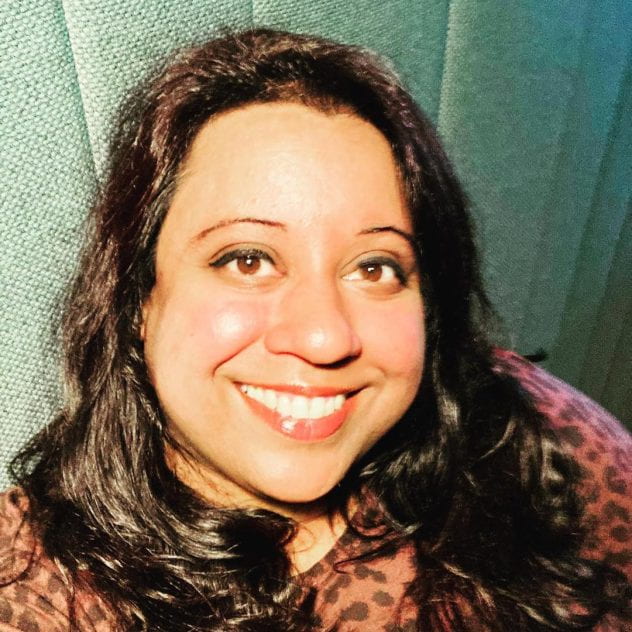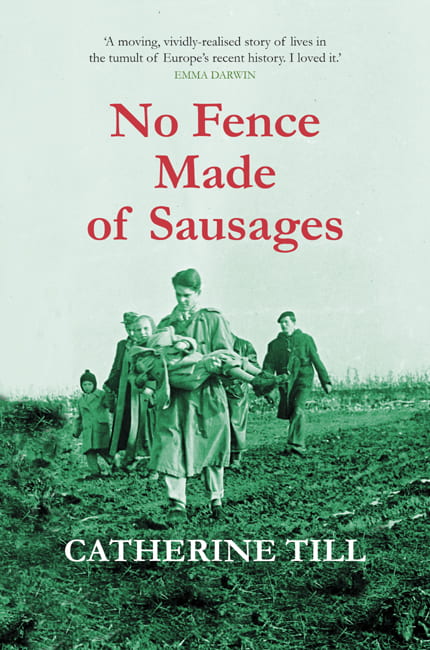
Suchandrika’s sell out show I Miss Amy Winehouse
Suchandrika Chakrabarti is carving out quite a name for herself on the comedy writing circuit, but you may not know that many years ago she took some writing short courses at City. Back in 2009, she took Novel Writing and Longer Works class, then taught by Rebekah Lattin-Rawstrone and in 2010 she took part in the Novel Studio.
Speaking of her experience on City’s courses, Suchandrika said ‘I guess I’d have to preface this with some context on where I was in my life at the time, because that really affected my experience, and my relationship to writing. I was in my mid-twenties, and I had lost both my parents in my late teens, so I was really in the depths of double bereavement. I had always thought of myself as a writer, and my parents had enthusiastically supported me in that idea, but I wasn’t writing. I came to the courses at City in that headspace, i.e. not the ideal one.
‘In the years since I took the courses, I have gone on to teach others how to write personal essays, which are often about trauma. I’ve found that there are two stages in wanting to write about the experience: the first is often the result of a rush to make sense of what happened for the writer themselves. It’s incredibly vulnerable and isn’t conducive to editing; it shouldn’t be published. The second stage is about shaping the experience in a way for the reader to find meaning in it; this version can be published, as the writer has processed the trauma, at least to some extent.
‘I was deep in stage one at the time I took the courses. I wasn’t ready for class feedback, or to write from my own emotional experience. It did feel good to be writing at all, though. I found the teachers supportive and very encouraging. The courses introduced me to the process of getting class feedback, the value of being around other writers and of engaging with their work, too.
‘The courses gave me back some faith in my own writing as the teachers were so thoughtful and considered in their feedback. I had a story published in a literary magazine called Decongested Tales, and had the chance to read it out at an event at Foyles bookstore. These were really important events that helped me gain some confidence back in writing, and I still think of them fondly.
‘It wasn’t until I went freelance in 2018 that I was able to make some headway. I started with writing personal essays, in which I explored using metaphor and more literary language to write about grief, my parents’ stories and my experiences.
‘Over the next two years, I wrote a number of personal essays for a wide array of journalistic outlets, from Marie Claire to Prospect Magazine, by way of Artsy.net and gal-dem. Then the pandemic happened, and during that time I found myself teaching online, setting up a Personal Essays Masterclass with the London Writer’s Salon.
‘Personal essays were a helpful middle ground between journalism and memoir / fiction for me; they allowed me to write what I had once felt was unwriteable, and put it out into the world.
‘I’ve always loved comedy and watching stand-up, but I had no idea how to begin with trying it out. After hosting a podcast at my last staff journalist job, at the Daily Mirror, I had a lot of people asking me if I did stand-up. I wanted to give it a go, but couldn’t guarantee free evenings until I went freelance. Finally, in January 2020 – the twentieth anniversary of my mum’s death – I did a six-week stand-up course at The Bill Murray in Islington, a two-room north London pub set up by comedians. I loved it, and found that performing improved my writing – plus I was in a much better frame of my mind to take on the live feedback that stand-up comedy brings.
‘During the pandemic, I made a start on a novel that drew on my experiences of grief, but was definitely fiction. That wasn’t quite the right format though, and I felt that maybe the narrative voice sounded more like stand-up. So I challenged myself to write my story as my Edinburgh Fringe debut. I wrote I Miss Amy Winehouse, which is creative non-fiction rather than fiction, written in a month (May 2021). I worked it out in various performances across the UK and Europe, then took it to Edinburgh in August 2022, supported by Soho Theatre’s Edinburgh Labs. It’s the closest I’ve come to writing my novel.
‘I’ve had a couple of poems published recently, and I’m working on some scripts, as well as my second Edinburgh show. I’ve even started playing about with character comedy, including wigs and other silly props! I wrote for TV for the first time this year, on ‘Have I Got News For You’, which would make my parents incredibly proud.
‘Writing a novel is still the ultimate dream, and I really hope to get there one day.’

Author and comedian, Suchandrika Chakrabarti
Suchandrika Chakrabarti is a writer, comedian and podcaster from London. She is currently working on her second solo show, Doomscrolling.
If you’re interested in following in Suchandrika’s footsteps, check out our full range of short writing courses HERE.
Or see what else we offer HERE.







Recent Comments